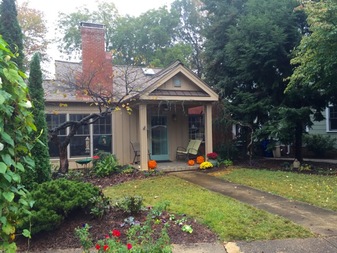 Our house in Raleigh's Five Points neighborhood. Our house in Raleigh's Five Points neighborhood. My wife Loretta and I, and our children Linnea and Sam, have lived in this house, in this neighborhood in Raleigh, since 1992 when Sam was 2 years old. During this time the 'hood has evolved. The property values have grown dramatically, and more than once in the span of time that we lived here we have considered cashing out and moving someplace else. But we haven't. Because, to be honest, there is no better place on earth than the one we are embedded in. Yes, we could probably have had a big house with a larger porch on a plot of land that gives me opportunity to grow all those dwarf conifers I have always wanted. We could have the "play room" in the basement that our children have always pointed out in other people's houses. We could have a garage. No, we really don't need a garage. Our choice was to embed ourselves in a place - both the micro-place within our four walls and a more macro-place in what we call our neighborhood. It is this embedded connection to place that we simply could not duplicate if we cashed out and sought another house in another neighborhood, no matter how "nice". Our house was smallish to raise two children, but we did it without sacrificing much. Now as our daughter prepares to leave for college and beyond it is perfect. No "down-sizing". What we gained were relationships with people around us - many of those who participated in Sam's play group when he was a toddler (he's 25) are still around. We went to the funeral of one young man this past year. We've watched our neighbors across the street renovate their house, live a young person's life for a while (they traveled a lot) and now raise their little boy and advance in their respective careers. We've watched the big sweet gum across the street come down (Thank you, Jesus...no more gum balls!) and many of the dogwoods die, even as our hemlock has grown from Christmas tree size to forest material. We've watched Halloween become such an event that we have to close off both ends of the street so there is room for the pig-picking before the young'uns set out on their trick-or-treating. We've seen our own house get re-built stick by stick from the inside as we changed and molded it to our personalities and lifestyle, and our little yard start out with a play structure and swings in the back and evolve into a big screened porch, a terrace and fire pit for us and for Linnea's teenage friends. People are adding on and even tearing some houses down and replacing them. A wistfulness rises only to be tamped down by the reality of our neighborhood as a living thing - constantly changing. That is a good thing. It is a common practice in this culture where houses are a commodity, supported by a governmental subsidy for taking on greater mortgage interest, to consider them disposable - our neighborhoods the same. When things get rough we cash out. I've heard the wisest way to grow wealth from this "investment" is to sell your house after a few years, buy another one, then re-sell it and keep on doing this until you've accumulated the largest possible house you can imagine in the best possible neighborhood. The reason a large house is valued more than a small house is that we buy and sell our homes by the square foot, roughly comparable to selling your car by the pound. Because of this headlong rush toward turning our homes into commodities and investments, we are losing the human connection to the landscape of both home and neighborhood that so characterized this country for so many generations. We paint everything beige to please the next owner (who probably doesn't like beige any more than we do). Part of what has made our relationship with this particular micro-landscape so valuable has been our ability to watch our children grow here, to watch other people's children grow, to be part of the gestalt of a place that is more than the sum of its houses. We've benefited in ways not easily measured from our connection to this place. What we may have given up in square footage and equity we have more than gained back in memories, in history, in meaning that these brick walls and narrow sidewalks hold for us. This is why we don't sell the American National Parks for development, and go off and buy a bigger piece of land with the proceeds. There is meaning in these places. They are unique and we all benefit from being in them - soaking up the history of a place, of a people. We lose it when land and buildings become only a vessel for growing wealth. So think about sending down a few roots. Make your money on the stock market or buy a lottery ticket and re-introduce yourself to your home - make the connection.
0 Comments
Leave a Reply. |
AuthorDaniel Howe lives in Raleigh, NC. He's interested in a lot of things so this blog is all over the place. Archives
May 2018
Categories |
City Planning / Public Process
|
|

 RSS Feed
RSS Feed
